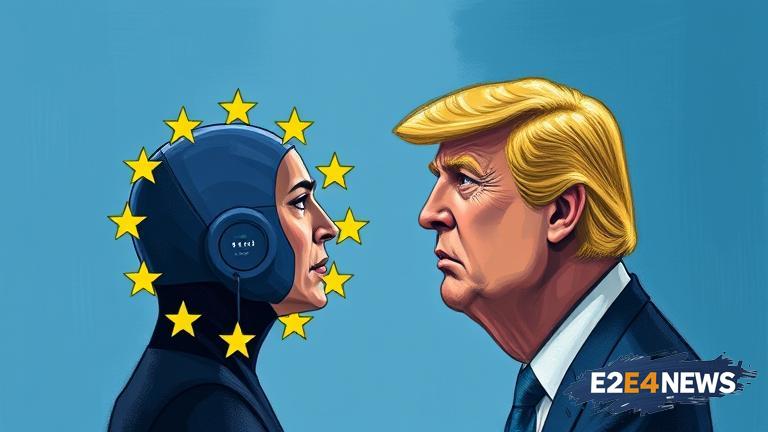The European Union is resisting pressure from the Trump administration to adopt a more lenient approach to tech regulation, with EU officials arguing that it is their sovereign right to govern their own digital landscape. The EU has been at the forefront of regulating big tech companies, implementing strict rules on data protection, competition, and online content. The Trump administration, on the other hand, has been critical of the EU’s approach, arguing that it stifles innovation and harms American tech companies. However, the EU remains committed to its regulatory framework, which it believes is necessary to protect the rights of its citizens and promote a fair and competitive digital market. The EU’s stance on tech regulation has been shaped by its experience with the Cambridge Analytica scandal and other high-profile data breaches, which highlighted the need for stronger regulations to protect user data. The EU’s General Data Protection Regulation (GDPR), which came into effect in 2018, has set a new standard for data protection globally, and has been emulated by other countries. The EU is also taking a tough stance on competition, with regulators launching investigations into the dominance of big tech companies such as Google, Amazon, and Facebook. The EU’s approach to tech regulation is not just about protecting users, but also about promoting innovation and competition. By creating a level playing field, the EU hopes to encourage the growth of European tech companies and reduce the dominance of American giants. The Trump administration’s attempts to exert control over tech regulation have been met with skepticism by EU officials, who argue that the US has a different approach to regulation. While the US has a more laissez-faire approach to tech regulation, the EU has a more interventionist approach, which it believes is necessary to protect the public interest. The EU’s stance on tech regulation has also been influenced by its concerns about the spread of disinformation and online hate speech. The EU has implemented rules to require social media companies to remove hate speech and disinformation from their platforms, and has also launched initiatives to promote media literacy and critical thinking. The EU’s approach to tech regulation has not been without controversy, with some critics arguing that it is too restrictive and stifles innovation. However, the EU remains committed to its regulatory framework, which it believes is necessary to protect the rights of its citizens and promote a fair and competitive digital market. The EU’s stance on tech regulation is also influenced by its commitment to the principles of the European single market, which aims to create a level playing field for businesses across the EU. The EU’s regulatory framework is designed to promote the free movement of goods, services, and people, while also protecting the public interest. The EU’s approach to tech regulation has also been shaped by its experience with the digital single market, which aims to create a seamless digital landscape across the EU. The EU has implemented rules to require companies to provide cross-border services, and has also launched initiatives to promote digital skills and literacy. The EU’s stance on tech regulation is not just about regulating big tech companies, but also about promoting the growth of European tech companies and reducing the dominance of American giants. The EU has launched initiatives to promote startup growth, and has also invested in digital infrastructure, such as 5G networks and data centers. The EU’s approach to tech regulation is also influenced by its concerns about cybersecurity, with regulators launching initiatives to promote cybersecurity awareness and best practices. The EU has also implemented rules to require companies to report data breaches, and has launched initiatives to promote cybersecurity research and development. Overall, the EU’s stance on tech regulation reflects its commitment to protecting the rights of its citizens, promoting innovation and competition, and creating a fair and competitive digital market.
